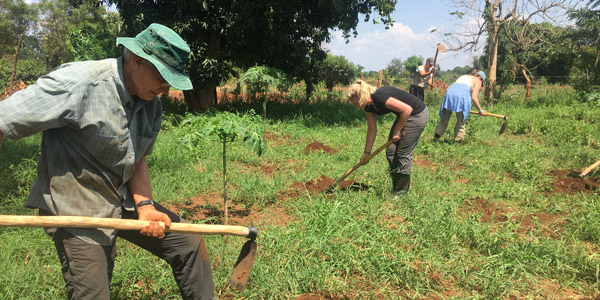
Linking cultures and students worldwide
Story by Barb McBreen
Images by Catherine Swoboda, Christopher Gannon
Whether it’s measuring the health of a stream in Iowa, or feeding children in Uganda, Dick Schultz’s passion for making the world a better place is evident in his energy and dedication to teaching.
Jesse Matt first met Schultz, a professor in natural resource ecology and management, in an Alabama swamp during an Iowa State University forestry watershed camp. Matt, a May forestry graduate, was scrambling around a muddy stream, collecting samples for a hydrology lab. He says the conditions in the swamp were treacherous.
“The water was ice cold, the mud was ankle deep, humidity clung to the forest like a wet blanket and the threat of snakes was ever-present,” Matt says. “Most professors wouldn’t be caught within a hundred miles of mud, poisonous snakes or physical work. Then there is Dick Schultz. He was right there in the stream with us, trudging from team to team.”
Schultz takes the same approach in his forestry classes. It’s all hands on. Students learn by doing.
On a recent site visit, Schultz’s energy is obvious as he leads his watershed management class to a stream in Boone County. He just returned from working with students in Uganda the night before, and he walks vigorously ahead of his class, down a slope and across a pasture spanning about one-half mile.
“Dick is a high-energy teacher,” says Bree Marmur, a doctorate student and teaching assistant in natural resource ecology and management. “If you haven’t taken his class—you should.”
At the site, the students break into teams to measure and evaluate a half-mile section of stream channel. Schultz and Marmur move up and down the stream to answer student questions.
“We’re teaching them to assess stream health and how to improve the health of the stream,” Marmur says. “Dick also shares a lot of personal stories about water issues at the global level.”
There’s little that will keep Schultz and his students from a trip to the field. “You can stand in front of a class and talk, but if the students haven’t felt the wind or heard the birds – it’s not experiential learning,” Schultz says. “My students learn quickly that the only time we don’t go out into the field is when it’s lightning.”
Back in Schultz’s office, a few photos and mementos from study abroad trips are tucked among his bookshelves. When asked what he hopes students take away from his study abroad classes he picks up a hoe and a machete.
“The students are not tourists. They are learning about other cultures and providing a service,” Schultz says.
He emphasizes studying abroad isn’t about riding a tour bus, but rather preparing students to become global citizens. He hopes to help them understand other cultures through service. He says it’s important to understand and work with others to bring about change.
“When you go to another country you can’t walk in and say you have the answers,” Schultz says. “I tell students they are there to learn and provide service, and they come back changed people.”
The machete and hoe are the two tools used by students in the Iowa State University Uganda Service Learning Program. The program has worked in partnership with the donor-supported Iowa State University Center for Sustainable Rural Livelihoods for 12 years.
“The beauty of the program is that we have made a commitment. It makes a difference to the people you are interacting with because they can see our long-term commitment,” Schultz says.
In Uganda, Iowa State students work with students from Makerere University in Uganda to teach elementary school children. Together they also plant school gardens and harvest food. During the past 10 years the partnership has increased the caloric intake for the elementary students participating in the school lunch program from 50 calories two days a week to 800 calories three or more days a week. The program is working with five schools with a goal of providing nutritious lunches every day for every child.
“Dick helps us all see the unifying themes of humor, compassion and love for the land that define us all, wherever in the world we may come from.”
Schultz gets emotional when he talks about the children in Uganda.
“There are all these bright, beautiful kids with almost zero opportunities. The number of kids, especially girls, who get to high school is minimal,” Schultz says.
In rural Uganda Schultz is a legend, says Matt, who spent the spring semester working in Uganda. He adds that the people in the Kamuli district in Uganda know who is wearing the green hat and working in the sweet potato fields.
“He visits Uganda every summer, bringing humor, his green hat, an iron work ethic and a small army of Iowa State students eager to help the world,” Matt says. “These are the ingredients for one of the most rewarding study abroad opportunities at Iowa State.”
It is hard to win the respect of a Ugandan farmer, Matt says. The farmers work long hours in the worst conditions and the soil is harder than a steel hoe.
“Dick is the cultural link between Iowa State students and the people of rural Uganda,” Matt says. “He helps us all see the unifying themes of humor, compassion and love for the land that define us all, wherever in the world we may come from.”



